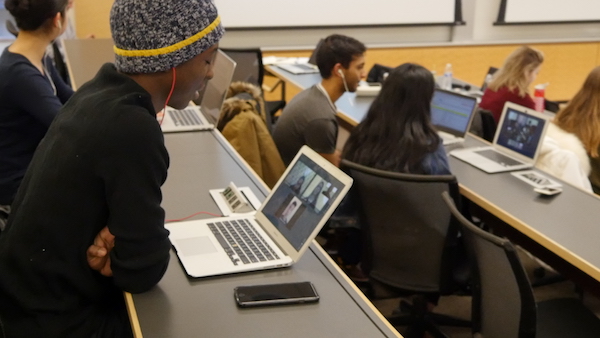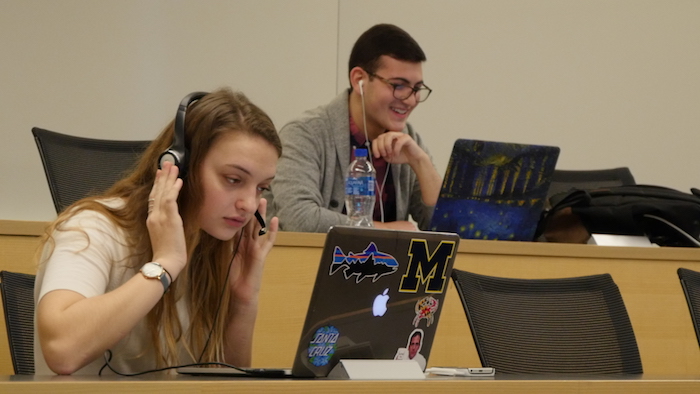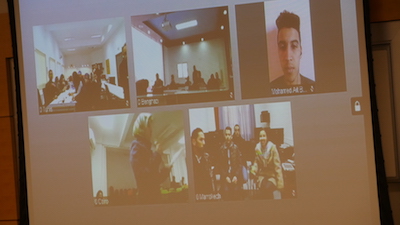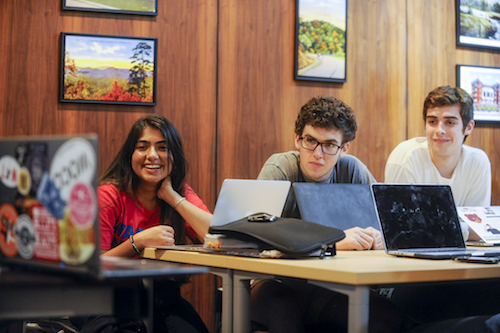This case study shares five valuable lessons for impact investors and enterprises to strengthen their impact measurement practices. The case is based on experiences testing an impact measurement framework with social enterprises in Nicaragua, Brazil and Peru. The case provides recommendations to improve the impact measurement practices of investors, as well as the enterprises they support. For investors, creating a standardized set of indicators to be shared across enterprises is beneficial for aggregating data, using resources efficiently, and facilitating shared learnings across their network of investees. For investees, impact measurement can expose vulnerabilities along the value chain that affect an enterprise, such as turnover and client loyalty.

A Freyr Energy solar plant in India, one of the companies included in the research. (Image courtesy of Freyr.)
WDI’s newly created Energy Initiative will examine the effectiveness of several enterprises in India that have been working to bring energy access to marginalized communities in the country for the past three years.
The project, in conjunction with Miller Center at Santa Clara University and New Ventures India, will look at 26 energy enterprises in India to identify what drives performance across different contexts, and develop a framework to inform strategies for energy enterprises that improve commercial viability and increase access to energy. WDI also will study the success of current investments in the energy sector in India, explore new ways to strengthen existing partnerships, and determine if any other gaps exist.
WDI’s Colm Fay will review existing data captured by the Energy Access India program, and conduct additional desk research and remote interviews with some of the participating enterprises and partners. Fay, who is leading WDI’s Energy Initiative, will travel to India in April for follow-up interviews with select enterprises and partners.
The findings from this work will be published in a research report aimed primarily at entrepreneurs who wish to launch and operate inclusive energy enterprises. The report will also provide insights for the ecosystem of clean energy investors and other organizations interested in better connecting energy enterprises with the right kinds of financial and non-financial support – and provide them with actionable recommendations.
“The findings from this research will help both enterprises and investors to better understand the opportunity for commercially viable energy business models in India, and contribute to a more integrated ecosystem of financial and non-financial support,” Fay said.

Ecozen Solutions, which has developed a solar powered cold storage system, is another company included in the research project. (Image courtesy of Ecozen Solutions)
The report is scheduled to be released in September to coincide with the end of the Energy Access India program, which began in 2015. The program, funded by the U.S. Agency for International Development (USAID), provided acceleration services to the 26 energy enterprises in the country. The enterprises represent a range of technologies and business models, and have achieved varying levels of success in growth, impact, and financial sustainability.
“Miller Center sees itself as an open source learning laboratory, so sharing what we and our partners have learned through the Energy Access India project is important,” said Andrew Lieberman, senior director of New Programs at Miller Center. “Partnering with WDI for this paper elevates the end result in every way, because WDI brings their deep research capacity, unbiased perspective, and distribution reach.”
Miller Center manages a social enterprise accelerator, the Global Social Benefit Institute (GSBI) with a mission to end global poverty and protect the environment. Since 2003, GSBI has helped to accelerate over 819 social entrepreneurs, who have collectively raised over $580 million. New Ventures promotes clean technology innovation in Asia and Africa to serve the needs of the current and future generations in a sustainable manner.

By Amy Gillett
Note: This blog post also appeared on NextBillion.net, which is managed by the William Davidson Institute at the University of Michigan.
I recently had the opportunity to spend time with author and professor Elmira Bayrasli. I was truly inspired after reading her book “From the Other Side of the World: Extraordinary Entrepreneurs, Unlikely Places,” and recently invited her to speak to students and faculty at the University of Michigan.
In her book, Bayrasli looks at the emergence of entrepreneurship in seven developing countries — including India, Nigeria, Mexico, and Russia — by detailing the journeys of local entrepreneurs and the obstacles they had to overcome to build high-growth businesses. These obstacles included poor infrastructure, corruption and a culture of bribery, and a lack of public spaces where business-minded folks could congregate, converse and have the kinds of chance meetings that often spark innovation.
My interest in this topic stems from working on entrepreneurship development over the past dozen years at the William Davidson Institute. (Note: WDI is the parent organization of NextBillion). I’ve overseen programs training women to scale up businesses in Rwanda as part of the Goldman Sachs 10,000 Women project, bringing new entrepreneurship pedagogy and curricula to universities in Papua New Guinea, and running a social entrepreneurship virtual program that brings U.S. students together with counterparts in the Middle East to come up with entrepreneurial solutions to pressing problems.
I was interested to hear Bayrasli’s perspective on why entrepreneurship is exploding in developing economies. She credits the combination of technology and globalization. Both forces help entrepreneurs make new connections – which are key for raising capital, coming up with fresh ideas and generating new business models. One of the successful entrepreneurs she highlights in her book, Monis Rahman, created Pakistan’s first matchmaking website and its most successful job search website, having tapped LinkedIn founder Reid Hoffman for advice, as well as other contacts he developed while studying at Stanford and working in Silicon Valley. The title of that chapter, “Steve Jobs Lives in Pakistan,” sums it up well.
Another factor Elmira mentioned is the trend of many entrepreneurial young people seeking to return to their home countries after completing a Western education. She contrasted this with her experience in Turkey, where her parents emigrated from before settling in the U.S. In the past, ambitious Turks dreamed of moving to the United States. Now they see opportunity in their home country and feel pride about being from there. They see homegrown successes – such as Mavi Jeans and AirTies, a wireless network company Bayrasli also profiles in her book – and they want to return and create businesses too. Not only do these successful companies provide inspiration, they’ve also helped transform the way Turkish business operates, setting new standards based on global best practice and leaving the old, corrupt practices behind.
I found Bayrasli’s perspectives on global entrepreneurship fascinating. An area where our thinking diverges, however, is on the role of education and the question of whether entrepreneurship can be taught. Bayrasli contends that aspiring entrepreneurs are best served by studying the classics – she recommends reading Tolstoy for instance – to understand human motivation and gain empathy. She doesn’t believe entrepreneurship is best taught in business schools. While I appreciate Tolstoy just as much as the next Russian literature major, I have come to see the value of teaching business skills – from negotiating to marketing to basic finance – to those who at least have a fledgling business and are looking for guidance on how to grow it to the next level. While Steve Jobs, Bill Gates, and Mark Zuckerberg were all college dropouts and never returned to school for a certificate in entrepreneurship, I see them as outliers in the world of entrepreneurship – exceptionally gifted, surrounded by savvy businesspeople, and lucky in their timing.
I hope you enjoy my interview with Bayrasli, available below.
Amy Gillett is vice president of the Education Initiative at the William Davidson Institute at the University of Michigan.

Students gather at U-M’s Ross School of Business for the launch of the M²GATE program.
Brett Ritter admitted to feeling a bit nervous at the kickoff event for WDI’s new M²GATE program where he would meet his international teammates for the first time. He worried that cultural differences and a language barrier might hinder his ability to work with his peers from the Middle East and North Africa.
“There were a lot of unknowns that made me a little worried if this program was right for me,” the freshman finance major at the Ross School of Business said. “But I was given great guidance by our leaders as to what the program was all about. The mentors made me excited to go forward working with my team. I also enjoyed meeting my team for the first time.”
“We learned a lot about each other in such a short period and it really opened my eyes.”
Ritter is one of 53 U-M students participating in the first cohort of the MENA-Michigan Initiative for Global Action Through Entrepreneurship (M²GATE) program. He and his fellow Wolverines are paired with 112 undergrads from top universities in Egypt, Libya, Morocco and Tunisia to find entrepreneurial solutions to social challenges in the Middle East and North Africa (MENA) region. (Applications are being accepted through March 1 for the second and third cohorts for the program, which is open to undergraduates from Eastern Michigan University and Wayne State University along with all three U-M campuses.)
For the first cohort, the 165 total students were placed on 28 teams of five to six students each. Working virtually, teams will develop social entrepreneurship projects and accompanying pitches over an eight-week period. Guiding them along the way are instructors, mentors, and successful entrepreneurs from MENA and Michigan. The teams coordinate times for virtual group work and produce a pitch video as a final assignment.
Claudia Cornejo, a sophomore at Ross studying business administration, couldn’t wait to attend the Jan. 26 program kickoff. She was excited to meet the students she would work with, understand their perspectives on the program and why they are interested in social impact. After meeting her teammates from Morocco, she said she was fascinated by the idea that although they grew up in different worlds, all were aware of social challenges within their own communities and were motivated to join a program that addressed them.

“It was incredible to see just how similar our personalities and perspectives were, even though our upbringings and environments are so distinct,” Cornejo said.
At the program kickoff, participants from the four MENA countries were beamed via video chat into a Ross School of Business classroom where the U-M students were seated. After introductions, the students worked on a team-building exercise before coming back together to report on what they learned. Program organizers then walked the teams through the eight-week schedule and where to go for resources.
Cornejo said she is interested in education policy in the U.S. and around the world, and believes entrepreneurship could be an untraditional approach to help solve challenges.
“This program took my interests to the next level by allowing me to work one-on-one with people from different parts of the world,” she said. “I have come across many different programs and organizations that do work internationally but never give you this unique personal relationship with fellow students around the world. M²GATE provides the perfect platform that connects me to students with the same passions and goals as me, but with different perspectives, worldviews and approaches to try and achieve these goals.”
Ritter said he is currently working on a social entrepreneurship project independently and thought M²GATE would help him learn more. He also wanted to connect with people from other cultures.
“This is a once-in-a-lifetime experience where we could have mentors help us help the world,” Ritter said. “What I found appealing about the project was that it teaches team building and valuable communication skills that are essential for any aspiring businessman.”
 Adrian Maloy, a second-year student majoring in accounting and finance at UM-Dearborn, was teamed with some students in Tunisia. He said the M²GATE program was appealing because it exposes him to a different culture.
Adrian Maloy, a second-year student majoring in accounting and finance at UM-Dearborn, was teamed with some students in Tunisia. He said the M²GATE program was appealing because it exposes him to a different culture.
“Our world is becoming smaller, and taking the opportunity to gain global competencies will become a companion in how people develop socially,” Maloy said. “I feel this program allows you to gain those competencies.”
Cornejo and Ritter also see the program as a possible stepping stone to studying abroad and maybe a career overseas.
“I have always seen my career path taking me abroad, however this will be my first experience communicating across different cultures to try and ameliorate a social issue affecting many people around the world,” Cornejo said. “I want to learn how other cultures approach issues such as education reform, and how we can translate and combine our ideas to create an even better solution than just one community or culture could come up with.
“I am a firm believer that analyzing different perspectives and cultures can lead you to a more comprehensive solution to any problem.”
Ritter said he hopes the program gives him some guidance on “what my purpose is on helping society.”
“We all need to do our part, and I hope this program can make me realize what that part is,” he said, adding that it might be spending a semester or more studying overseas.
“Studying abroad is one of the greatest experiences I can get,” he said. “It’s college. I want to live it to the fullest, however I can.”
Applications for M2GATE are being accepted through March 1 here.
The WDI Global Impact Speaker Series will feature a professor and author who has worked with entrepreneurs around the world. She will talk about how entrepreneurship has transformed the economies of low- and middle-income countries and how these places will produce the next generation of Silicon Valley-style innovators.
Elmira Bayrasli’s talk, “Steve Jobs Lives in Pakistan: The Rise of Entrepreneurs Everywhere (and What That’s Doing to the World),” is at 5 p.m. on Tuesday, Feb. 6 in room R0210 at the Ross School of Business. It is free and open to the public. A reception will follow immediately.
Bayrasli, author of “From the Other Side of the World: Extraordinary Entrepreneurs, Unlikely Places,” will discuss how entrepreneurship has taken hold globally. She is co-founder of Foreign Policy Interrupted and a professor at Bard College’s Global and International Affairs program.
“We are really excited to offer this talk by Elmira Bayrasli,” said Amy Gillett, vice president of WDI’s Education Initiative and its Entrepreneurship Development Center. “Students will hear about her vast experience in helping startups scale up in emerging markets and benefit from her great insights into the role that entrepreneurship plays in economic development.”
Bayrasli said countries such as China, Brazil, India, Turkey and Nigeria have transformed economically over the past two decades thanks, largely, to entrepreneurship. She also will talk about what this “rise of the rest” has meant for world affairs, including the election of Donald Trump.
In addition to her teaching and writing, Bayrasli once served as chief spokesperson for the Organization for Security and Cooperation in Europe (OSCE) Mission while living in Sarajevo, Bosnia and Herzegovina. From 1994-2000, Bayrasli was a presidential appointee at the U.S. State Department, working for then-U.S. Secretary of State Madeleine Albright and U.S. Diplomat Richard Holbrooke.
She is a regular contributor on global entrepreneurship for the online publication TechCrunch. She also provides analysis on foreign policy, particularly on Turkey. Her work has appeared in Reuters, Foreign Affairs, Washington Post, Fortune, Forbes, CNN, BBC, Al Jazeera, the Wall Street Journal, and the New York Times. Bayrasli sits on several boards, including Invest2Innovate, Turkish Women’s International Network and Our Secure Future.

Students at Wofford College conduct a virtual exchange discussion in a program to increase cross-cultural understanding funded by the Stevens Initiative in 2016. (Image credit: Mark Olenckim/Stevens Wofford College.)
As the first cohort of Michigan students begin collaborating online with their peers in four North African countries, WDI is seeking interested undergraduate students at Eastern Michigan University, all three campuses of the University of Michigan and Wayne State University to join the next two groups of participants for this unique international opportunity.
The program, the MENA-Michigan Initiative for Global Action Through Entrepreneurship (M2GATE), pairs undergrads from the three Michigan universities with those in Egypt, Libya, Morocco and Tunisia to find entrepreneurial solutions to social challenges in the Middle East and North Africa (MENA) region. It also increases cross-cultural understanding and equips young people with the skills needed to thrive in a 21st century economy.
Working virtually, teams will develop social entrepreneurship projects and accompanying pitches over an eight-week period with the help of instructors, mentors, and successful entrepreneurs from MENA and Michigan. Each cohort of approximately 128 international students and 64 Michigan-based students will culminate in a virtual competition.
The teams comprised of students from Michigan universities and students from Egypt, Libya, Morocco and Tunisia will coordinate times for virtual group work and produce a pitch video as a final assignment. In all, students will spend about 32 hours on the program. The second cohort is scheduled to run from early April to early June; the third cohort will be from early May to mid-July.
Judges will look for scalable solutions that feature science, technology, engineering, and math – or STEM-based – innovations. The MENA students from the winning teams will have the chance to travel to Michigan to interact with entrepreneurs in Ann Arbor and Detroit, and, as a team, pitch their projects to an expert panel for feedback and further development.
The partner organizations in M²GATE include Benghazi Youth for Technology & Entrepreneurship (BYTE) in Libya, Al Akhawayn University in Morocco, and Tunis Business School at the University of Tunis in Tunisia.
Michigan college students selected for the program will attend an orientation meeting as well as debrief and wrap-up sessions at the end of the eight weeks. They will be invited to watch lectures and interactive discussions on WDI’s ExtendEd learning portal on six topics: cross-cultural team building; communication skills; leadership development; design thinking and creative inquiry; introduction to entrepreneurship; and, creating a business model canvas.
WDI was one of 13 organizations chosen for the second round of the 18-month program, which is funded by the Stevens Initiative, an international effort to build career and global competence skills for young people in the U.S. and MENA region. The Initiative honors the legacy of U.S. Ambassador Chris Stevens, who devoted his life to building bridges between people from different cultures.
“After the Arab Spring in 2010, young people in this region increasingly turned to social entrepreneurship to address the challenges in their societies,” said Amy Gillett, vice president of WDI’s Education Initiative. “Given the state of these economies and the upsurge of entrepreneurial interest, this program comes at an ideal time.”
The co-curricular program will equip students with skills in entrepreneurship, team building, innovation and design thinking, international business, problem solving and critical thinking.
“This is a wonderful opportunity for students to work cross-culturally, forge new international connections, and gain exactly the type of 21st century skills needed to succeed in today’s global economy,” Gillett said.
Interested undergraduate students from EMU, U-M and WSU can learn more about M²GATE at the program website. They may also attend an upcoming screening of the film “Extreme by Design,” at 4-6 p.m. Feb. 1 in Room R0210 at the Ross School of Business. WDI is co-hosting a screening of the documentary, which features college students introducing innovative products in emerging markets by applying design thinking and entrepreneurship principles. The showing will followed by a panel discussion and a reception. Space is limited, so students are encouraged to register here.
Housed at the Aspen Institute, the Stevens Initiative is a collaboration between the family of Ambassador J. Christopher Stevens, the U.S. Department of State, the Bezos Family Foundation, the governments of the United Arab Emirates and Morocco, and Microsoft, Twitter, Vidyo, and LRNG.
For more details and to apply to M²GATE, click here.
WDI’s Education Initiative collaborated with a university in Papua New Guinea (PNG) to develop a curriculum for a new MBA-level specialization in entrepreneurship, one of three schools the Institute has worked with in the country on building new business courses.
The administration at Divine Word University (DWU) recently approved the new Entrepreneurship Specialization for the MBA program. WDI Faculty Affiliates Julie Felker and Peter Scott worked with the dean of DWU’s business school, Prof. Venkata Rao Devaraju, on developing the program.

The project was in partnership with the Center for International Private Enterprise (CIPE) and was originally designed to work with some PNG universities to develop a one-week module on entrepreneurship.
Initially, DWU was interested in only developing an entrepreneurship module, but its leadership changed their minds in early 2017. Felker and Scott soon began working with Rao on curriculum development, advising him on how to strengthen the coursework through adding elements, removing redundancies across classes, and providing teaching and learning resources for him to consider. In May 2017, Felker returned to PNG and worked directly with Rao to finalize the curriculum, develop learning goals, fill out course content and consider textbooks to use.
DWU’s MBA is comprised of eight required courses with four electives that make up a specialization. The specialization in entrepreneurship will be the third at DWU, complementing two existing streams in management, and accounting and finance. The four courses in the Entrepreneurship Specialization are comprised of 10 modules covered over two and a half days. The courses are: Theory and Practice of Entrepreneurship; Small Business Management; Creativity & Innovation and Design Thinking for Entrepreneurs; and, Project Management and Feasibility Analysis.
Felker said working with Rao on developing curriculum was very efficient because he was the direct liaison with DWU leadership. He kept her informed throughout the development process about the University’s commitment and support for the MBA specialization.
“It was fantastic news to learn that the MBA specialization was approved by the University’s leaders, realizing the positive impact it will have on students’ and ultimately the region,” Felker said.
 Just like DWU, Pacific Adventist University (PAU), also based in New Guinea, had bigger ideas for its entrepreneurship programs and partnered with WDI. The school conducted a review and revision of its entire undergraduate curriculum, and was interested in adding more entrepreneurship coursework. Leaders eventually added a double major in Accounting and Entrepreneurship.
Just like DWU, Pacific Adventist University (PAU), also based in New Guinea, had bigger ideas for its entrepreneurship programs and partnered with WDI. The school conducted a review and revision of its entire undergraduate curriculum, and was interested in adding more entrepreneurship coursework. Leaders eventually added a double major in Accounting and Entrepreneurship.
Felker suggested the courses to be offered in the Entrepreneurship major, and the faculty then worked from there, making revisions after consultation with internal and external stakeholders.
“I was basically an external evaluator in the curriculum review process so I had a great deal of opportunity to provide feedback, which they thoughtfully considered, and most often incorporated in their curriculum drafts,” Felker said.
The PNG project is one of many entrepreneurship development programs that WDI has spearheaded over the past 12 years. Other recent projects have included training more than 300 women entrepreneurs from throughout Rwanda, and providing a consulting team to help an entrepreneurship service center in Kosovo better serve local entrepreneurs.
In 2016, WDI collaborated with CIPE on a mentorship training project in Bahrain.
“I am so pleased that these universities will now be offering new courses and specializations in entrepreneurship after working closely with WDI’s Entrepreneurship Development Center faculty affiliates,” Amy Gillett, vice president of WDI’s Education Initiative. “Ultimately, the economy in Papua New Guinea will benefit as the graduates of these programs go on to start companies or to energize existing companies with entrepreneurial thinking.”
Gillett said WDI looks forward to working with additional universities in the future on helping them build entrepreneurship curriculum.
“Spreading new tools and techniques around entrepreneurship pedagogy is a large part of our work in at WDI’s in-house Entrepreneurship Development Center,” she said.
WDI is co-sponsoring the screening of a documentary featuring college students introducing innovative products in emerging markets by applying design thinking and social entrepreneurship principles. At the screening, a WDI-managed program that offers a rare opportunity for international teamwork and entrepreneurship open to all undergraduates will also be discussed.
The screening of the documentary, “Extreme by Design,” will be followed by a panel discussion and reception. The event is scheduled from 4-6 p.m. Feb. 1 in Room R0210 at the Ross School of Business. The event is open to UM undergrads. Space is limited; register HERE. (Watch a trailer for the film below.)
Extreme By Design Website Trailer from Ralph King, Hawkview Pictures on Vimeo.
The documentary follows students from Stanford University’s Institute of Design as they create potential life-saving products for people in Bangladesh, Indonesia and other developing countries.
Those attending the screening will have an opportunity to learn about participating in a new virtual exchange program with fellow students in the Middle East and North Africa (MENA). The MENA-Michigan Initiative for Global Action Through Entrepreneurship (M²GATE), managed by WDI, is open to any U-M undergraduate student.
During the eight-week M²GATE program, U-M students will be teamed with fellow students in Egypt, Libya, Morocco, and Tunisia. Together, the teams will develop and launch social entrepreneurship projects with the help of instructors, mentors, and successful entrepreneurs from Michigan and the MENA region. In the process, students will learn how to work as a team, collaborate with mentors and build bridges between cultures.
“We are excited to offer this opportunity to screen ‘Extreme by Design,’” said Amy Gillett, vice president of WDI’s Education Initiative. “The film highlights teams of university students working together and applying design thinking principles to solve big problems in emerging markets. It is fascinating to see the various issues that arise with team dynamics and how the team members are able to overcome these.”
In addition to WDI, the screening is being sponsored by Innovate Blue, the Barger Leadership Institute and Global Scholars – both at the College of Literature, Sciences, and the Arts.
The Samuel Zell & Robert H. Lurie Institute for Entrepreneurial Studies, in partnership with the William Davidson Institute and Aparajitha Foundations, today announced the launch of the Michigan Academy for the Development of Entrepreneurs (MADE), a nonprofit institute that works with entrepreneurship development organizations (EDOs) in developing countries to give individuals operating businesses in these environments the knowledge and best practices they need to thrive. Serial entrepreneur Mike Pape will serve as executive director.
In a developing economy, entrepreneurs and small business owners are key to creating a vibrant, sustainable business climate, but can face unique challenges getting the support they need to succeed. Rather than lean on a theoretical or conceptual framework, MADE collects the practical lessons learned from partner organizations around the world and networks created from years of University of Michigan startup consulting projects in economies such as India, Vietnam, Kosovo and Morocco to help entrepreneurs make important decisions that will add value to their companies. MADE is currently focused on India, but is also building on past work conducted by the William Davidson Institute and Zell Lurie in Vietnam and Kosovo, with plans for further expansion.
“Whether they’re in Silicon Valley or Africa, entrepreneurs bring the energy and vitality that every economy needs to succeed, and the Zell Lurie Institute is committed to supporting them wherever they may be–but what works for a startup in one part of the world doesn’t necessarily work for others,” said Stewart Thornhill, executive director of the Zell Lurie Institute. “At Michigan Ross, we champion the value of learning business through action. Together with Aparajitha and the William Davidson Institute, we want to learn what works for entrepreneurs in different environments based on their experiences, teach what we’ve learned and work with our partner organizations to spread those lessons. We’re looking forward to combining the entrepreneurial know-how of the Zell Lurie Institute with the global business expertise of the William Davidson Institute and the on-the-ground experiences of Aparajitha Foundations to empower local small businesses and economic development around the world.”
“In developing countries like India, ‘learned’ entrepreneurship can go a long way in ensuring the socio-economic development of the country,” said Bharath Krishna, chairman of Aparajitha. “Entrepreneurs not only create value economically but also add to the social fabric of the locality where they have their business. Entrepreneurship that is not just romanticized but done with the understanding of some basic nuances can make a tremendous impact in creating a sustainable ecosystem both locally and nationally. We’re committed to MADE as a true ‘nation-building’ exercise.”
“At the William Davidson Institute, we’re dedicated to helping developing economies find and create sustainable growth solutions,” said Paul Clyde, president of the William Davidson Institute. “A key part of our mission is partnering with businesses, including entrepreneurs, in developing economies to cultivate profitable business models. MADE is a cooperative arrangement that combines the expertise across the University of Michigan with that of successful businesses in these countries. We see MADE as a powerful way to realize our goals as an institute.”
Successful Serial Entrepreneur Mike Pape Named Executive Director
As the executive director of MADE, Pape will provide leadership to a team of MBA students, who are themselves participating in a new program that the Ross School of Business at University of Michigan sees as the next level of action-based learning. The students will not just work on projects but are, in a real sense, running MADE, with Pape providing the continuity from year to year.
Pape has co-founded several life sciences companies, including Esperion Therapeutics, which was acquired by Pfizer for $1.3 billion in 2004; Akebia Therapeutics, which successfully IPOed in 2014; Orchard Venture Partners, a life science venture capital firm; and Nymirum, a drug discovery firm based in North Carolina. Before he became an entrepreneur, Pape was instrumental in the success of numerous cardiovascular drug discovery and development programs, including Lipitor at Upjohn and Parke-Davis/Warner-Lambert (now Pfizer). He holds a bachelor’s degree from the University of Michigan.
“Mike has been a fixture in the Ann Arbor entrepreneurial ecosystem for years—and his track record of founding and scaling successful startups speaks for itself,” said Thornhill. “When it came time to choose the right person to launch and scale MADE—and guide others through the process of getting their own ventures off the ground—there was no question in our minds that Mike was up to the challenge.”
“I know firsthand the challenges entrepreneurs face in getting their ventures off the ground—and I know how valuable their contributions are both as a vehicle for innovation and as a participant in the local economy,” said Pape. “I’m looking forward to working with the full breadth of resources the University of Michigan has to offer—from the MBAs who will be managing all of MADE’s operations and the alumni worldwide who will serve as coaches and local resources to the knowledge resource and institutes housed here. We have the ability to create some really great outcomes, and we’re all looking forward to the challenges ahead.”
For more information, please visit https://madeentrepreneur.org/.
About the Samuel Zell & Robert H. Lurie Institute for Entrepreneurial Studies
The Institute and its Center for Venture Capital and Private Equity Finance bring together an impactful combination of deep-seated knowledge, enriching experiences and strategic opportunities from the front lines of entrepreneurship and alternative investment. Students’ learning experiences are further enhanced through internships, entrepreneurial clubs, business competitions and campus-wide events that foster valuable networking and engage the business community. The School’s five student-led investment funds, with over $8M under management, immerse students in the entrepreneurial business sourcing, assessment and investment process. Founding Zell Lurie advisory board members include Samuel Zell, chairman of Equity Group Investments, and Eugene Applebaum, founder of Arbor Drugs Inc. For more information, visit the Institute’s website at www.zli.bus.umich.edu.
About the William Davidson Institute
Established at the University of Michigan in 1992, the William Davidson Institute (WDI) is an independent, non-profit research and educational organization focused on providing private-sector solutions in emerging markets. Through a unique structure that integrates research, field-based collaborations, education/training, publishing, and University of Michigan student opportunities, WDI creates long-term value for academic institutions, partner organizations, and donor agencies active in emerging markets. WDI also provides a forum for academics, policymakers, business leaders, and development experts to enhance their understanding of these economies. WDI’s mission is to create true, sustainable solutions through understanding, testing, and implementing actionable, private-sector business models that address the challenges and opportunities in emerging markets. To learn more, visit www.wdi.umich.edu.
About Aparajitha Foundations
Aparajitha Foundations, a part of Aparajitha Group, is a charitable trust (Registration No. 463/97) with the objective of supporting the less privileged mainly in terms of education and health. The trust focuses on ‘transformational changes’ to build a stronger community as against transactional changes which may or may not end in long term benefits to society.
Aparajitha Group has been training executives and staff from non-metropolitan areas to make them ‘work’ ready since 2000. Many of them, regardless of their background, have scaled new peaks in their careers with the right kind of inputs and orientation. Aparajitha has drawn on its extensive experience in empowering executives and identified and developed modules for life skills which could be imparted even at an early stage in life. To learn more, visit http://www.aparajitha.org.
The intersection of entrepreneurship, U.S. foreign policy, international development and Latin America will be the subject of a talk by a senior Defense Department official at 5 p.m. Thursday, Nov. 30 in Room 2240 at the Ross School of Business. The discussion, which is free and open to the public, is co-sponsored by WDI and the LSA Center for Latin American and Caribbean Studies (LACS).
The talk by Lt. Col. Eldridge Singleton, a senior official and attache with the U.S. Dept. of Defense, is titled, “The Role of International Development and Entrepreneurship on U.S. Foreign Policy in Latin America.”

Lt. Col. Eldridge Singleton
Singleton will discuss U.S. foreign policy in Latin America, the country’s foreign trade policy and the United Nations’ approach to international development, and how these affect entrepreneurs looking to establish themselves in the region and what challenges they might encounter.
Before his current role, Singleton served as the U.S. Army Attaché to Bolivia from 2015-17, Acting Defense Attaché to Jamaica in 2016, and Operations Officer and Army Section Chief for the Security Cooperation Office of the U.S. Embassy in Port-au-Prince, Haiti from 2013-15. He also served in several command and staff positions in the United States, the Middle East, and Latin America, including operations to combat terrorism. After multiple combat tours, he transitioned to a career as a multilingual U.S. Army Foreign Area Officer.
Singleton has been recognized for his work, including four Bronze Star Medals for heroic service in combat, a Defense Meritorious Service Medal for interagency service overseas, an Army Commendation Medal with “V” device for valor in combat, and the Department of State’s Meritorious Honor Award.
He received his bachelor’s degree and awarded commission in the U.S. Army as a Second Lieutenant Infantry Officer at the United States Military Academy at West Point. He also holds a master’s degree in Latin American Studies from San Diego State University.